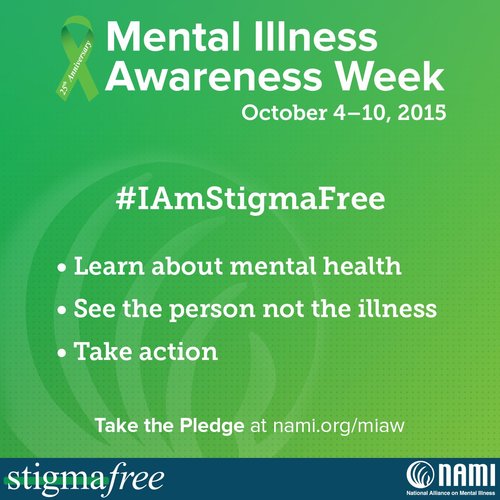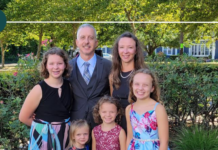As mothers, we are presented with information and screening information on Postpartum Depression after we give birth. Our physicians may also let our partners/spouses know warning signs for postpartum depression. However, as mothers, we don’t know whether or not 10, 15, or 20+ years from now we may be navigating mental illness and mental health concerns with our spouse, teen, young adult, or adult children. We don’t know if mental illness will become part of our immediate family’s reality down the road.
It is Mental Illness Awareness Week (October 4-10). This year’s theme is #IAmStigmafree. When the US media reports on mental illness, it is often in relation to homelessness, veterans returning from active duty in zones of conflict and war, and mass shootings. Stigma is attached to all of those conversations. The media often doesn’t talk about mental illness in a way that constructively raises awareness of the true reach of mental illness in everyday families like my family and your family. Thus, NAMI is striving to help other treat people with mental illness as individuals so they are seen as people and NOT as a diagnosis which carries stigma in our culture.
Mental illness has a history that runs through both of my parents’ families and extended families. My family history of mental illness (that I know about) includes: depression, anxiety, bipolar disorder, alcohol addiction, drug addiction, and gambling addiction. Some of these individuals have been treated via inpatient and outpatient programs and are being treated on an on-going basis. Some individuals in my extended family, unfortunately, lost their lives to their mental illness.
Each person in my close and extended family who suffers from mental illness is an individual and is NOT their clinical diagnosis. They have names, faces, and roles in my family and the lives of countless other people.
Due to this history, I’m acutely aware that mental illness could be my, my husband’s, or my child’s reality in the future. (And as I inherited worrying from my maternal grandmother, I worry about this.)
The Mayo Clinic defines mental illness as “a wide range of mental health conditions — disorders that affect your mood, thinking and behavior. Examples of mental illness include depression, anxiety disorders, schizophrenia, eating disorders and addictive behaviors.” The distinguishing feature between mental health conditions that come and go from our lives and true mental illness is (again per the Mayo Clinic) “when ongoing signs and symptoms cause frequent stress and affect your ability to function.”
Mental illness is not the result of a single, solitary event. The National Alliance on Mental Illness (NAMI) reminds that “research suggests multiple, interlinking causes. Genetics, environment and lifestyle combine to influence whether someone develops a mental health condition.” Also, perhaps the hardest thing for anyone—family member, community member, casual observer, the media, etc.—to remember is that mental illness is NOT a choice.
There are resources for individuals in mental health crisis AND for families supporting those in crisis. Professionals do need to be involved to help the individual in crisis obtain help and to support family as caregivers.
Emergency Resources:
Call 911 if you or a person you care about is in danger. Important directions from NAMI: “Notify the operator that it is a psychiatric emergency and ask for an officer trained to help people with a mental health condition.”
If you are in crisis or just need to talk about suicidal thoughts, call 1-800-273-TALK (8255), the National Suicide Prevention Lifeline. It is a 24-hour, toll-free, confidential suicide prevention hotline. The National Suicide Prevention Lifeline also has an online chat option.
Support Resources:
The National Alliance on Mental Illness Dane County offers support, advocacy, and education for not only individuals living with mental illness, but also for families and care givers of individuals living with mental illness. The support is in the form of support groups, education (for family, caregivers, and community members), and advocacy.
NAMI Dane County also maintains a Resource Guide for the Dane County area that addresses all kinds of support areas a person in crisis may need. Please use this as a starting point to help some one you care about get help.
NAMI Dane County maintains a Warmline (not a crisis line!) for individuals living with mental illness. Per NAMI, “the Warmline is answered by people who have lived experience of mental health and/or substance use issues and are trained to support people during tough times.”
Remember, #IAmStigmafree. Seek support for family who needs it and get support for yourself if you are in a care giving role. Thank you for caring. Thank you for seeing beyond a clinical diagnosis.













Thank you, Laura, for your understanding and sensitive coverage of this issue of Mental Illness. Well done. Love, Mom